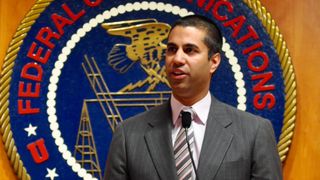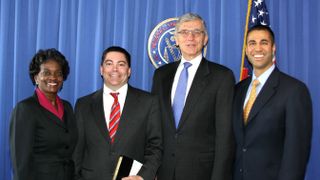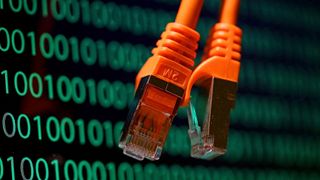FCC votes to begin dismantling net neutrality regulations
New rules will be put in place after 90 days of gauging public opinion

Three weeks after announcing its plans to the public, the Federal Communications Commission has taken its first step in dismantling Obama-era net neutrality regulations classifying internet service providers (ISPs) as a utility.
The decision was made in a 2-1 vote, with FCC Chairman Ajit Pai (pictured above) and Commissioner Michael O'Rielly approving plans to remove Title II regulations from ISPs, and Commissioner Mignon Clyburn dissenting.
The next step for the FCC is to allow the public to share its opinion over the course of the next 90 days to help shape the agency's focus before putting any new laws into place.

- On December 14, 2017, the US FCC (Federal Communications Commission) repealed net neutrality rules, sparking an outcry among startups, NGOs, but also the public in general, in the US or abroad. VPNs can actually allow you to get around Net Neutrality controls set by ISPs. Here is a list of the best VPN providers we've tested.
The FCC's vote comes two years after 2015's Open Internet order classified ISPs as common carriers, subjecting them to regulations similar to other utility services.
Chairman Pai, who has been quite vocal of his distaste for the 2015 order since day one, says Title II classification restricts investment in broadband by ISPs, and that deregulation will return the internet to a "Clinton-era light-touch framework that has proven to be successful."
In his statement today, Pai reiterated his claim that domestic broadband capital expenditures from the nation's top 12 providers decreased by 5.6% percent between 2014 and 2016, blaming the Open Internet order with discouraging investment.
"Today, we propose to repeal utility-style regulation of the Internet," Pai said. "We propose to put technologists and engineers, rather than lawyers and accountants, at the center of the online world."
Get daily insight, inspiration and deals in your inbox
Get the hottest deals available in your inbox plus news, reviews, opinion, analysis and more from the TechRadar team.
Pai also dismissed "a study released by a pro-Title II special interest" that claims the broadband market is actually on the rise, saying the report "makes basic mistakes. (Our guess is he's referring to this report, but we can't say for certain.)
While Title II classification does put ISPs in a more-regulated position than they were prior to 2015, supporters of the Open Internet order say it also prevents them from throttling, blocking, or otherwise discriminating any type of internet traffic from its customers, which is the central tenet of net neutrality.

Holes in the net
Opponents of the FCC's proposed changes argue that cutting down Title II classification will make it difficult, if not impossible, to maintain net neutrality regulations, which proponents say are essential for keeping an open and competition-friendly internet.
Many major companies essentially founded by the internet came out in favor of net neutrality last month, such as Facebook, Google, and Netflix — the latter of which has had notable drama with ISPs in the past, claiming Comcast, Verizon and AT&T throttled its streaming services back in 2014.
Over 800 startups and entrepreneurs also voiced concerns over Chairman Pai's plan, saying net neutrality keeps the competition field level for budding businesses by keeping massive telecom companies in check.
Additionally, over 170 civil rights groups advocated for net neutrality, saying affordable internet access is crucial for citizens by providing not just leisure, but "essential healthcare services, educational resources and employment opportunities."
"While it does not come as a surprise that this Administration’s Internet policies favor a handful of powerful corporations at the expense of society," wrote the Writer's Guild of America West in a statement today, "it is nevertheless alarming to witness yet another planned repeal of regulations that benefit consumers.”

What next?
In the interest of transparency - something Pai argues the 2015 Open Internet order severely lacked - the Chairman has made his process for repealing Title II regulations a more public process.
"You may agree or disagree with what the FCC is doing," Pai said, "but you have been and will be able to see what it is we’re doing and why. "
Should you have such positive or negative feelings, you can leave your comments directly with your local representatives by calling 1-844-872-0234, contact the FCC at 1-888-225-5322, or file with the FCC's Consumer Complaints Center.
Most Popular


